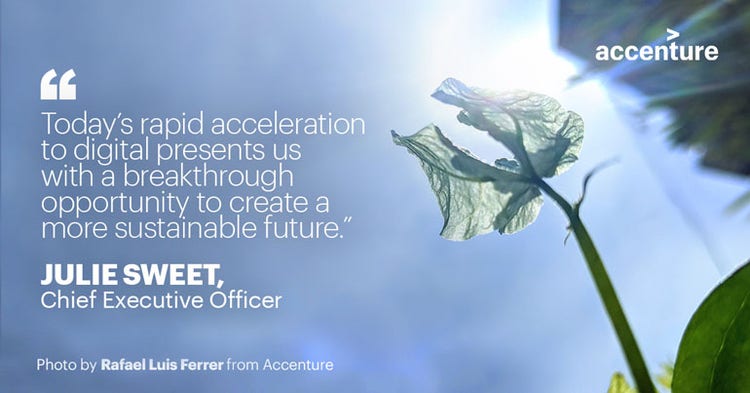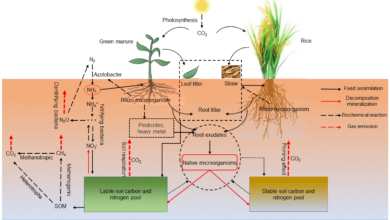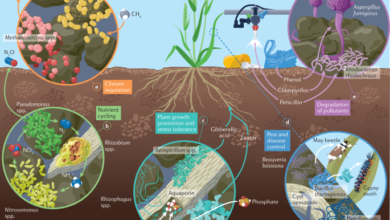What Does Accenture Mean by Sustainability Will Be the New Digital? Unveiling the Future

Accenture believes that sustainability will have the same transformative impact as technology has had on businesses, becoming a critical factor for success in the digital era. The concept of sustainability has gained significant attention in recent years as organizations acknowledge the need to address environmental and social challenges.
However, the integration of sustainability into business strategies and operations has often been treated as a separate initiative. Accenture suggests that this approach will no longer suffice, as sustainability will become interconnected with digital transformation, shaping the way companies operate and compete.
Accenture predicts that much like digital technology has disrupted traditional business models, sustainability will cause a similar paradigm shift, requiring organizations to embed sustainable practices into all aspects of their operations.
Accenture’s Perspective On Sustainability
Transition To Digital Sustainability
Accenture believes that the future of sustainability lies in digital transformation. This means embracing technology to drive sustainability efforts in new, innovative ways. This transition to digital sustainability is crucial in addressing the environmental and social challenges we face.
Integration Of Sustainable Practices
Accenture emphasizes the integration of sustainable practices into core business operations. This entails incorporating sustainable strategies into every aspect of the organization, from supply chain management to product development and customer engagement.
Digital Transformation In The Context Of Sustainability
Accenture, a global professional services company, has coined the phrase “Sustainability Will Be the New Digital,” emphasizing the increasing importance of sustainability initiatives in the digital age. This blog post will delve into Accenture’s perspective on the intersection of digital transformation and sustainability, shedding light on how technology and data-driven solutions can address environmental and social challenges.
Technological Solutions For Sustainability Challenges
As the world grapples with pressing sustainability challenges, advancements in technology offer promising solutions to mitigate their impact. By leveraging emerging technologies such as Internet of Things (IoT), Artificial Intelligence (AI), and blockchain, organizations can develop innovative approaches to reduce resource consumption, carbon emissions, and waste. These solutions enable businesses to optimize their operations, streamline supply chains, and enhance energy efficiency, contributing to a more sustainable future.
Data-driven Sustainability Initiatives
In the context of sustainability, data has become a critical asset for organizations striving to make informed decisions and drive meaningful change. Through data collection, analysis, and visualization, businesses can identify areas for improvement, track environmental performance, and measure the effectiveness of sustainability initiatives. Utilizing advanced analytics, companies can uncover valuable insights that guide strategic planning and foster innovation. With access to real-time information, organizations can proactively address sustainability issues, build transparency, and engage stakeholders in collaborative efforts.
The Interplay Between Sustainability And Digital Innovation
As Accenture boldly declares that “sustainability will be the new digital,” it is crucial to understand the interplay between these two powerful forces. In today’s rapidly evolving world, digital innovation holds immense potential to drive a sustainable future. From impacting sustainable development goals to the emergence of new trends in sustainable digital solutions, the integration of sustainability and digitalization promises a transformative path forward.
Impact Of Digitalization On Sustainable Development Goals
Digitalization has the power to accelerate progress towards sustainable development goals (SDGs) by enabling increased efficiency, transparency, and collaboration across various sectors. By leveraging digital technologies, organizations and governments can address pressing environmental and social challenges with remarkable agility and effectiveness.
Here are some ways in which digitalization is making a significant impact on sustainable development goals:
- Enhanced Data Analytics: By harnessing big data and advanced analytics, organizations can gain valuable insights into their environmental and social impact. This data-driven approach allows for informed decision-making and facilitates the prioritization of actions that drive sustainable outcomes.
- Efficient Resource Management: Digital solutions enable more efficient allocation and management of resources such as energy, water, and materials. Automated processes, smart grids, and real-time monitoring systems contribute to minimizing waste and optimizing resource consumption.
- Supply Chain Transparency: Through digital platforms, supply chains can be traced and monitored from source to end-consumer, ensuring responsible sourcing practices, reducing carbon footprints, and promoting fair labor conditions.
- Citizen Engagement: Digital technologies offer avenues for increased citizen participation and engagement in sustainability initiatives. Online platforms facilitate crowdsourcing of ideas, feedback, and collaboration, fostering a sense of collective responsibility towards sustainable development.
Emerging Trends In Sustainable Digital Solutions
The integration of sustainability and digitalization has given rise to emerging trends, leveraging technology to create innovative solutions with positive environmental and social impacts. These trends are shaping the future of sustainability and paving the way for transformative change:
- Internet of Things (IoT) for Sustainability: IoT allows for the seamless connectivity of devices, enabling real-time monitoring, automation, and optimization across various domains. In the sustainability realm, IoT applications can help manage energy consumption, reduce waste, and improve resource efficiency through data-driven insights.
- Blockchain for Sustainable Supply Chains: Blockchain technology ensures transparency, traceability, and trust in supply chains. It enables secured and immutable recording of transactions, allowing consumers and businesses to verify the sustainability claims of products and promote responsible sourcing.
- Renewable Energy Integration: Digital technologies play a crucial role in integrating renewable energy sources into existing power grids. Smart grids, energy storage solutions, and predictive analytics optimize renewable energy generation and consumption, reducing reliance on non-renewable sources.
- Virtual Collaboration and Remote Work: The COVID-19 pandemic has accelerated the adoption of remote work and virtual collaboration tools. By reducing the need for transportation and physical infrastructure, these digital solutions contribute to lower carbon emissions and a more sustainable work environment.
These emerging trends in sustainable digital solutions demonstrate the vast potential of the intersection between sustainability and digital innovation. As organizations and governments embrace this interplay, they can unlock new opportunities for sustainable growth and propel us towards a better future.

Credit: newsroom.accenture.com
Challenges And Opportunities In Embracing Digital Sustainability
Embracing digital sustainability presents both challenges and opportunities for businesses looking to align their operations with environmental and social responsibility. As Accenture emphasizes the shift towards sustainability as a new digital imperative, organizations must navigate barriers and leverage the benefits of prioritizing sustainable digital transformation.
Barriers To Implementing Sustainable Digital Strategies
1. Lack of awareness about sustainable digital practices.
2. Limited financial resources for implementing sustainable technologies.
3. Resistance to change from traditional, less sustainable practices.
Benefits Of Prioritizing Sustainable Digital Transformation
1. Reduced environmental impact and carbon footprint.
2. Enhanced brand reputation and customer loyalty.
3. Innovation opportunities for sustainable product and service development.
The Road Ahead: Envisioning A Sustainable Digital Future
Accenture’s vision of “Sustainability Will Be the New Digital” reflects a paradigm shift where environmental consciousness is seamlessly integrated into digital innovation.
Future Outlook For Sustainable Digital Initiatives
Companies are increasingly recognizing the importance of integrating sustainability principles into their digital strategies.
This shift paves the way for a future where technology is harnessed not only for efficiency and profit but also for environmental and social benefits.
Potential Impacts Of Merging Sustainability With Digitalization
- Enhanced corporate responsibility through sustainable operations.
- Improved resource efficiency and reduced carbon footprint.
- Creation of a more resilient and ethically driven business ecosystem.

Credit: www.accenture.com

Credit: www.futurecolossal.com
Conclusion
As we move into the future, Accenture’s vision of sustainability and digital integration becomes increasingly important. The convergence of these two forces signals a paradigm shift in business strategy, presenting both challenges and opportunities. Embracing sustainability as the new digital will not only drive innovation but also foster responsible practices for a better world.



